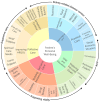Geriatric Assessment in Older Patients with Advanced Kidney Disease: A Key to Personalized Care and Shared Decision-Making-A Narrative Review
- PMID: 40095872
- PMCID: PMC11900943
- DOI: 10.3390/jcm14051749
Geriatric Assessment in Older Patients with Advanced Kidney Disease: A Key to Personalized Care and Shared Decision-Making-A Narrative Review
Abstract
As the global population ages, so too does the prevalence of older people with chronic kidney disease (CKD). Helping people age well with CKD and supporting older people with end-stage kidney disease (ESKD) to make personalized decisions regarding kidney replacement therapy (KRT) or conservative care (CC) are an essential component of care. However, these factors are relatively underreported in both the fields of nephrology and geriatric medicine, and prospective, randomized evidence is lacking. This narrative review article, authored by both nephrologists and geriatricians, discusses specific geriatric issues that arise in older people with CKD and why they matter. The available evidence for KRT or CC in older people with frailty is outlined. The importance of performing a comprehensive geriatric assessment, or a modified nephrogeriatric assessment, to ensure a systematic evaluation of the person's medical problems and life needs, goals, and values is described. We consider different models of nephrogeriatric care and how they may be implemented. Kidney supportive care-addressing an individual's symptoms and overall well-being alongside the more traditional nephrological principles of preventing disease progression and optimizing risk-is highlighted throughout the article. We outline ways of identifying the later stages of a person's disease journey, when transition to palliative care is indicated, and elaborate methods of preparing patients for this through multidisciplinary advance care planning. Finally, we discuss practice and systems for nephrogeriatric care in five different European countries and consider future directions, challenges, and highlights in this rapidly evolving, increasingly relevant field.
Keywords: end-stage kidney disease; geriatric assessment; older patients; shared decision-making; treatment pathways.
Conflict of interest statement
The authors declare no conflict of interest.
Figures


References
-
- Bikbov B., Purcell C., Levey A., Smith M., Abdoli A., Abebe M., Adebayo O., Afarideh M., Agarwal S., Agudelo-Botero M., et al. Global, regional, and national burden of chronic kidney disease, 1990-2017: A systematic analysis for the Global Burden of Disease Study 2017. Lancet. 2020;395:709–733. doi: 10.1016/S0140-6736(20)30045-3. - DOI - PMC - PubMed
-
- Xie Y., Bowe B., Mokdad A., Xian H., Yan Y., Li T., Maddukuri G., Tsai C., Floyd T., Al-Aly Z. Analysis of the Global Burden of Disease study highlights the global, regional, and national trends of chronic kidney disease epidemiology from 1990 to 2016. Kidney Int. 2018;94:567–581. doi: 10.1016/j.kint.2018.04.011. - DOI - PubMed
-
- United States Renal Data System Annual Data Report: Epidemiology of Kidney Disease in the United States. [(accessed on 19 January 2025)];2024 Available online: https://usrds-adr.niddk.nih.gov/2024.
Publication types
LinkOut - more resources
Full Text Sources
Research Materials

